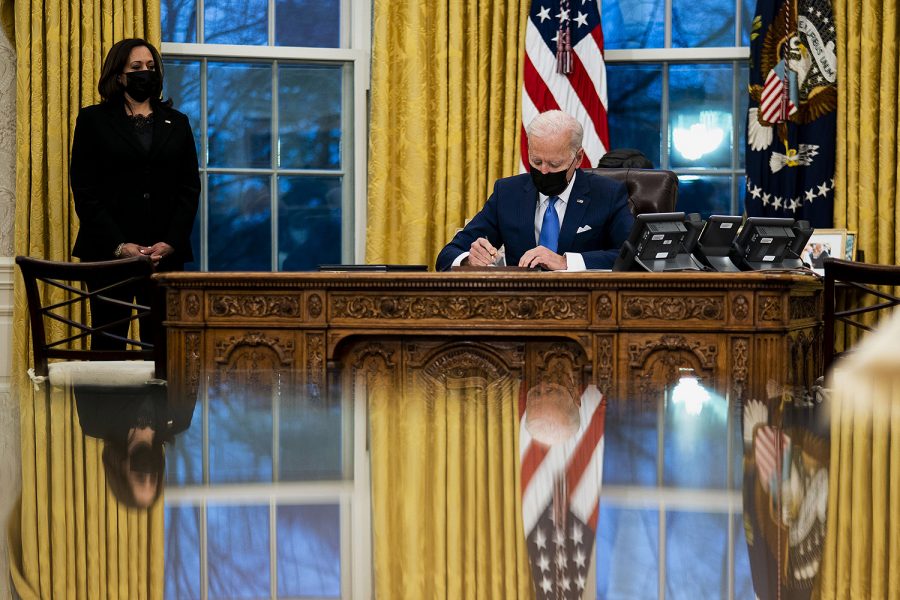Immigration advocates say Biden’s executive orders a solid step
Since his inauguration, President Biden has formally recommitted to DACA and proposed a bill to “modernize” the immigration system.
President Joe Biden signs several executive orders directing immigration actions for his administration as Vice President Kamala Harris looks on in the Oval Office at the White House in Washington, D.C., on Tuesday, Feb. 2, 2021. (Doug Mills/Pool/Getty Images/TNS)
February 2, 2021
President Joe Biden’s proposed immigration plans are set to reverse a host of Trump-era regulations, and many Iowa immigration reform advocates are hopeful the new regulations will bring continuity and efficiency to what they describe as a broken system.
Biden campaigned on a promise to reset the cogs in the immigration system. Since taking office, he has introduced the U.S. Citizenship Act of 2021, recommitted to DACA, and rescinded some of the Trump administration’s most infamous policies by ending the travel ban on citizens from primarily Muslim countries, and pausing deportations and border wall construction. To further build on these actions, on Feb. 2, Biden introduced new executive actions to be taken on immigration reform.
Communications Director for the American Civil Liberties Union of Iowa Veronica Fowler said the organization is happy the country is moving forward with what she called sensible and reliable immigration policy.
“I think under the Trump administration not only was it policy that was deeply problematic, but erratic,” Fowler said.
Trump’s immigration policies included attempting to eliminated DACA programs, beginning construction of a wall along the southern border, and pushed for family separation, and banned entry from majority-Muslim countries.
On Tuesday, Biden signed executive orders rolling back Trump-era policies which enforced family separation policies at the border.
The Trump administration implemented the “Zero Tolerance,” and “Remain in Mexico” immigration policies that enabled the separation of thousands of immigrant families and required families trying to enter the U.S. from Mexico to remain there while they awaited court hearings.,
The White House announced Monday Biden’s most recent executive actions will create a task force centered around family reunification, rollback and review Trump’s regulations that closed the border to asylum seekers and implement a new three-part plan for dealing with migration in this region.
“I think it’s hard to overstate the importance of these new policies, and we’re hopeful that we are beginning to move forward on more sane and effective policies on immigration,” Fowler said. “I think almost everybody, all over the political spectrum, can agree that our system for immigration is inhumane, and illogical and broken. I think under the Trump administration, that was just exacerbated.”
By recommitting to the Deferred Action for Childhood Arrivals policy — which allows individuals who came to the U.S. as children and meet additional requirements to received deferred action for two years and gain work eligibility — the change stabilizes the status of thousands.
Although there is no way to tell how many students enrolled at the University of Iowa are DACA recipients, according to the American Immigration Council, 2,420 active DACA recipients lived in Iowa as of March 2020.
“We are committed to providing a safe and inclusive environment for all students, and the recent Executive Order is a promising step toward a permanent solution for undocumented students or students with DACA status,” Interim Director of the UI’s Center for Diversity and Enrichment Tabitha Wiggins wrote in an email to The Daily Iowan.
RELATED: University of Iowa professors speak on concerns over immigration in America
But not all Iowans are rejoicing in the new immigration reform developments.
According to a press release from Jan. 28, Sen. Joni Ernst, R-Iowa, reintroduced her bill, “Sarah’s Law,” after an executive order that contained part of it was reversed by the Biden administration.
“The legislation, which is named after Sarah Root — an Iowan killed by an illegal immigrant who was released by federal law enforcement due to a loophole in the law and never faced justice — requires federal law enforcement to detain illegal immigrants criminally charged with killing or seriously injuring another person,” the release states.
The bill is supported by Sen. Chuck Grassley, R-Iowa, and other Republican senators.
Biden also reversed Trump’s ban on travel from certain majority-Muslim countries, and advocates for the international community are hoping it will create a more inclusive atmosphere.
UI Associate Director of International Student and Scholar Services Michael Bortscheller wrote in an email to the DI that while the reversal of the Muslim ban will not greatly impact international students, it will set a more welcoming attitude and tone.
“For example, the new rules may make it easier for relatives to visit their students while studying in the U.S.,” Bortscheller said.
The Biden administration’s U.S. Citizenship Act of 2021 bill which was sent to Congress is an effort to “modernize” the immigration system. The proposed bill seeks to create an effective roadmap to citizenship and prioritize keeping families together. The bill also advocates for protecting immigrant labor rights and boosting the economy.
Iowa City immigration attorney Jessica Malott said though she doesn’t know how the bill will go over in Congress, she thinks the plan is a step in the right direction.
“Do I think we need reform? Absolutely,” Malott said. “The old way hasn’t been working in my opinion for a long time now.”
The U.S. Citizenship Act of 2021 will help in eliminating excessive wait times and prolonging family separations, Malott said. In her work with family-based processing and representing clients in immigration court, Malott said the system is in desperate need of change.
“In the last like three years or so the immigration system has been gutted, it has been turned upside down — put on its head,” Malott said. “…So, taking a good hard look at our immigration system, and modernizing it, is something that has been needed to be done for a long time.”




















